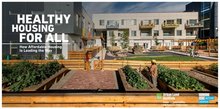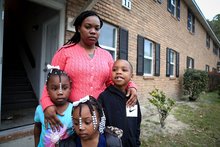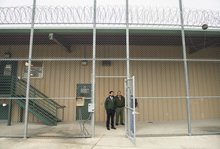Found 254 resources.
0
0
0
Democrats this week announced new legislation that would slash child poverty by paying low-income parents the kind of monthly allowance that is standard in other developed countries. But the lawmakers who introduced the bill, called the American Family Act, didn’t use the terms “child benefit” or “child allowance” at their Capitol Hill press conference Wednesday. Instead, they all called it a tax credit or a tax cut.
Topics: Child welfare, Dual-generation, Early childhood, Funding, Legislation & Policy, Low-income, Research
 Shared by Housing Is
on Mar 12, 2019
Shared by Housing Is
on Mar 12, 2019 0
0
0

We beef up law enforcement to attack crime, devote more funding to try and improve inadequate schools and tackle health disparities by getting more people to the doctor. But what if Baltimore could solve all of its persistent social problems by getting rid of poverty?
Topics: Asset building, Criminal justice, Funding, Health, Legislation & Policy, Low-income, Mental health
 Shared by Housing Is
on Mar 11, 2019
Shared by Housing Is
on Mar 11, 2019 0
0
0

Healthy Housing for All: How Affordable Housing is Leading the Way explores the affordable housing industry’s achievements in creating healthier housing environments and translates them into lessons for the broader housing marketplace. The innovations in healthy affordable housing present an opportunity to replicate healthy housing successes, as well as to respond to market demand across the residential development industry.
Topics: Health, Housing, Legislation & Policy, Research
 Shared by Housing Is
on Mar 11, 2019
Shared by Housing Is
on Mar 11, 2019 0
0
0

The housing crisis has given rise to acronyms which define the battle over new developments: "Yes in My Backyard" (YIMBYs) vs. “Not In My Backyard" (NIMBYs). And now there's a new acronym: PHIMBY, as in "Public Housing in My Backyard."
Topics: Community development, Housing, Legislation & Policy, West Coast
 Shared by Housing Is
on Mar 11, 2019
Shared by Housing Is
on Mar 11, 2019 0
0
0
Fort Worth’s work finding housing solutions for those facing homelessness can serve as a model for the rest of the country, Housing and Urban Development Secretary Ben Carson said Wednesday during a stop in Cowtown, one of several planned in Texas.
Topics: Funding, Homelessness, Housing, Legislation & Policy, Low-income, Partnerships, South
 Shared by Housing Is
on Mar 11, 2019
Shared by Housing Is
on Mar 11, 2019 0
0
0

The number of kids enrolled in Medicaid and the Children’s Health Insurance Program (CHIP) — two government health plans for the poor — fell by nearly 600,000 in the first 11 months of 2018, a precipitous drop that has puzzled and alarmed many health policy analysts, while several states say it reflects the good news of an improving economy.
Topics: Affordable Care Act, Child welfare, Early childhood, Health, Legislation & Policy, Low-income, Medicaid / Medicare, Research, Youth
 Shared by Housing Is
on Mar 8, 2019
Shared by Housing Is
on Mar 8, 2019 0
0
0

Residents of a South Carolina public housing complex are demanding answers after two of their neighbors died from the gas.
Topics: Housing, Legislation & Policy, Low-income, Safety
0
0
0
If rent-control measures pass in all of the states and cities where they're currently on the table, nearly a third of all renter households in the United States could secure relief.
Topics: Housing, Legislation & Policy
0
0
0

In a recently published report called “A Roadmap to Reducing Child Poverty” from the National Academies of Sciences, Engineering and Medicine, its co-authors suggest policy changes that they claim could cut child poverty in half in just 10 years.
Topics: Child welfare, Health, Legislation & Policy, Low-income
 Shared by Housing Is
on Mar 7, 2019
Shared by Housing Is
on Mar 7, 2019 0
0
0
The California Homeless Youth Project (HYP) is a research and policy initiative that highlights the issues and challenges faced by unaccompanied young people who are homeless or lack stable housing. This website provides state and local policymakers and others with information and policy resources specific to unaccompanied homeless youth, with a focus on young people in California.
Topics: Education, Homelessness, Housing, Legislation & Policy, Research, West Coast
 Shared by Housing Is
on Mar 5, 2019
Shared by Housing Is
on Mar 5, 2019 0
0
0
The grants provided under Assembly Bill 4702 aim to help colleges address hunger statewide, leverage more sustainable solutions to address basic food needs on campus, raise awareness for available food services, and continue to build strategic partnerships at the local, state and national levels to address food insecurity among students.
Topics: Education, Food insecurity, Funding, Legislation & Policy, Nutrition, Post-secondary, Youth
 Shared by Housing Is
on Mar 4, 2019
Shared by Housing Is
on Mar 4, 2019 0
0
0
Includes: The Strength of SNAP and SNAP Action Needed, The Emergency Food Assistance Program (TEFAP), Commodity Supplemental Food Program (CSFP), and Child Nutrition Reauthorization.
Topics: Food insecurity, Funding, Legislation & Policy, Low-income, Nutrition
0
0
0
Restoring the value of the minimum wage — and helping families cover basic needs — is essential to addressing hunger. The federal minimum wage of $7.25 an hour has not increased since 2009. A more adequate minimum wage would foster the nation’s economic strength and growth to be shared in more equitable ways. Low-income workers and their families would benefit the most from a higher minimum wage, leading to reduced poverty, hunger, and income inequality.
Topics: Asset building, Legislation & Policy, Low-income
0
0
0
Federal tax credits, like the EITC and refundable CTC, provide critical supports for millions of working women, children, and families every year. They supplement low wages and can help soften the financial impact of fluctuating incomes or job losses. These credits are especially important for communities of color and women.
Topics: Child welfare, Legislation & Policy, Low-income, Research
0
0
0
In light of the many costs generated by child poverty for the United States, a new report from the National Academies of Sciences, Engineering, and Medicine provides evidence-based policy and program packages that could cut the child poverty rate by as much as 50 percent while at the same time increasing employment and earnings among adults living in low-income families.
Topics: Child welfare, Legislation & Policy, Low-income, Research
0
0
0
The strengths and abilities children develop from infancy through adolescence are crucial for their physical, emotional, and cognitive growth, which in turn help them to achieve success in school and to become responsible, economically self-sufficient, and healthy adults. Capable, responsible, and healthy adults are clearly the foundation of a well-functioning and prosperous society, yet America’s future is not as secure as it could be because millions of American children live in families with incomes below the poverty line. A wealth of evidence suggests that a lack of adequate economic...
Topics: Child welfare, Dual-generation, Legislation & Policy, Low-income, Research
 Shared by Housing Is
on Mar 1, 2019
Shared by Housing Is
on Mar 1, 2019 0
0
0
The monthly benefits provided by SNAP enhance the food purchasing power of eligible low-income individuals and families. However, as described by many studies, including one by the Institute of Medicine, the greatest shortcoming of SNAP is that benefits for most households are not enough to get through the entire month without hunger or being forced to sacrifice nutrition quality. This limitation persists even in the face of overwhelming evidence on the gains from more adequate monthly SNAP benefits.This paper analyzes why SNAP benefits are inadequate, reviews the body of research showing...
Topics: Food insecurity, Legislation & Policy, Low-income, Nutrition, Research
 Shared by Housing Is
on Mar 1, 2019
Shared by Housing Is
on Mar 1, 2019 0
0
0

The 2019 state legislative season is in full swing, and SchoolHouse Connection is hard at work on 12 bills in 7 states (IN, KY, ME, NV, TN, TX, UT). We’re also supporting legislative advocates in 4 additional states (AZ, CA, MD, WA), and anticipate additional bills to be filed in LA, MO, NJ, and NC.
Topics: Child welfare, Education, Funding, Homelessness, Housing, Legislation & Policy, Low-income, Youth
 Shared by Housing Is
on Feb 28, 2019
Shared by Housing Is
on Feb 28, 2019 0
0
0

The city says it plans to move ahead with a costly, stopgap renovation of a New Orleans jail building to house dozens of inmates with mental health issues — but it also wants to keep its options open.
Topics: Criminal justice, Housing, Legislation & Policy, Low-income, Mental health, South, Supportive housing
 Shared by Housing Is
on Feb 28, 2019
Shared by Housing Is
on Feb 28, 2019 0
0
0
Over the past two decades, criminal justice reform has focused on evidence-based interventions to prevent arrests and incarceration and to facilitate community reintegration. These initiatives represent a movement toward a less punitive, more holistic approach to public safety, targeting critical social factors that lead to and perpetuate criminal justice involvement. Because housing problems are often a key underlying factor for people’s involvement with the criminal justice system, there are ways housing interventions can help lessen criminal justice involvement. Decriminalizing...
Topics: Criminal justice, Homelessness, Housing, Legislation & Policy, Low-income, Research, Stability
0
0
0
Welcome to the Food Research & Action Center’s winter issue of ResearchWire. This quarterly newsletter focuses on the latest research, reports, and resources from government agencies, academic researchers, think tanks, and elsewhere at the intersection of food insecurity, poverty, the federal nutrition programs, and health.
Topics: Child welfare, Food insecurity, Funding, Health, Legislation & Policy, Low-income, Nutrition, Research, Youth
0
0
0

The gas tax hasn’t budged since 1992, and highway trust fund is running on fumes. Could a Green New Deal pushed by Congress be a fix?
Topics: Community development, Funding, Housing, Legislation & Policy, Transportation
0
0
0
The development of new digital telecommunications capabilities combined with a persistent digital divide leaves the public sector with enormous responsibilities to promote network quality and deliver equitable access—but it can only do so by sensibly splitting regulatory responsibilities between the national and local levels. Unfortunately, news out of Washington, D.C. reveals the federal government has overstepped its appropriate role, constricting local governments’ abilities to craft locally tailored solutions.
Topics: Broadband, Community development, Legislation & Policy, Low-income
0
0
0
So, are the stars better aligned for an infrastructure bill this year? Unfortunately, rhetoric only goes so far, and Washington continues to suffer from the same elemental failure as it did in 2017—the U.S. lacks a clear infrastructure vision. Only when Congress is ready to truly debate what objectives the federal government hopes to achieve—and how to invest to advance those goals—can we begin to craft a transformative national strategy.
Topics: Community development, Funding, Housing, Legislation & Policy, Transportation
 Shared by Housing Is
on Feb 28, 2019
Shared by Housing Is
on Feb 28, 2019 0
0
0
New Orleans faced a major crisis in homelessness following Hurricane Katrina. In 2007, two years after the storm, there were more than 11,600 homeless people in the city. Since then, New Orleans stepped up its effort to tackle homelessness and has brought that number down 90 percent.
Topics: Homelessness, Housing, Legislation & Policy, Partnerships, South
 Shared by Housing Is
on Feb 21, 2019
Shared by Housing Is
on Feb 21, 2019 